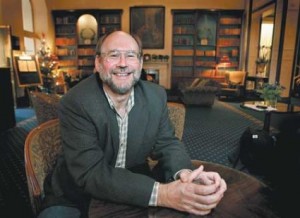 You may remember the story of our hapless Nobel Prize Hero, Doug Prasher. He lost his job in science and ended up driving a courtesy van at a Toyota dealership, but his research allowed others to win the Nobel Prize in 2008. Things are looking up for him, we are glad to report. You can read about it here, starting with this excerpt:
You may remember the story of our hapless Nobel Prize Hero, Doug Prasher. He lost his job in science and ended up driving a courtesy van at a Toyota dealership, but his research allowed others to win the Nobel Prize in 2008. Things are looking up for him, we are glad to report. You can read about it here, starting with this excerpt:
After joining the Toyota dealership, Prasher applied for a couple of science-related jobs in Huntsville, but nothing worked out. On one occasion he had an encouraging meeting with the hiring manager at a local company working on microfluidics; when the interviewer learned that Prasher drove a courtesy van, his interest cooled. There is no way to know how many other potential researchers were driven from their studies for similar reasons, or how many potential discoveries were never made because of the psychological and practical difficulties of the scientific lifestyle.
Finally in June 2010, several weeks after my visit, Prasher’s luck changed. He e-mailed me to say he’d been offered a science job at Streamline Automation, a local research and development company. Staffed by about 20 people, the company does work for NASA, the National Science Foundation, and the U.S. Department of Defense. Prasher’s first task when he started in late June was to help develop technology to sense toxic industrial gases.
He began cautiously. “There was none of the tremendous relief you might expect,” he says. “I had been so discouraged over the years that my attitude was, this may work out and it may not.” Gradually he settled into the job. At home he occasionally took science reading to bed, something he hadn’t done in years. “A lot of the hangdog is gone,” Gina told me. In December Prasher won a six-month, $70,000 grant from the Department of Defense to develop a field technique for categorizing tick specimens according to their mitochondrial genes, in hopes of limiting the diseases a doctor might diagnose. It brought a sense of accomplishment that had been missing from his life for a long time. In January he told me that the cloud of depression he had lived under for years was finally lifting. Science gave him a sense of purpose.
